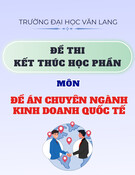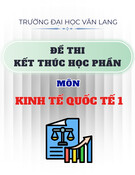
Finance & Marketing University
Department of Commerce
Academic years 2011 – 2.
TÀI LI U ÔN T P Ệ Ậ
THI TUY N SINHỂ
MÔN: TI NG ANHẾ
C PẤ: LIÊN THÔNG Đ I H CẠ Ọ
Chuyên ngành : TH NG M I QU C TƯƠ Ạ Ố Ế
April 2012
Instructor: Nguyen Thanh Nghiem
Thông tin v yêu c u đ thi t t nghi p:ề ầ ề ố ệ
Đ thi nh m ki m tra ki n th c t ng h p qua các h c ph n ti ng Anh trong ch ngề ằ ể ế ứ ổ ợ ọ ầ ế ươ
trình đào t o, c th : ạ ụ ể

a) Vocabulary: T v ng ph thông và chuyên ngành;ừ ự ổ
b) Grammar: Các c u trúc câu căn b n và nâng cao;ấ ả
c) Reading Comprehension: Kh năng đ c hi u các th lo i nh : báo cáo, ngh lu n, thả ọ ể ể ạ ư ị ậ ư
tín, thông tin trên các ph ng ti n truy n thông … ươ ệ ề
d) Writing: Vi t và trình bày các lo i th tín, memo, email và essay có s l ng 100 – 250ế ạ ư ố ượ
t .ừ
C u trúc đ thiấ ề
Đ I H CẠ Ọ CAO Đ NGẲ
Th i gian làm bàiờ90 phút 60 phút
S l ng câu h iố ượ ỏ 7-8 5-6
Tính đi m ể3đ. trên t ng s 10 đ c a môn cổ ố ủ ơ
s ở3đ. trên t ng s 10 đ c a mônổ ố ủ
CS
Cách làm bài:
- Thí sinh không đ c s d ng tài li u và t đi n;ượ ử ụ ệ ừ ể
-Ph i đ c k câu h i và trình bày bài làm theo đúng yêu c u trên gi y thi. Khôngả ọ ỹ ỏ ầ ấ
đ c làm bài trên đ . Các m u t ph i vi t b ng ch ượ ề ẫ ự ả ế ằ ữ IN HOA: A, D, C …
- Ph i vi t l i ph n, câu h i, m c s … rõ ràng. Không c n vi t l i câu h i.ả ế ạ ầ ỏ ụ ố ầ ế ạ ỏ
M t s ví d đi n hìnhộ ố ụ ể
Câu h iỏCâu tr l i đúngả ờ Câu tr l i saiả ờ
1) On the answer sheet write
the number and the letter A,
B, C or D for your answer
1)B; 2)A … 1)b 2)a
1)B incentives 2)A - ago
2) Match the two halves of
the sentences
2) F; 3)J 2) I placed the above order,
reference number 002993 …
3) Fill in the blanks …:
I placed the above order,
reference number 002993 …
3)placed 3) I placed the above order,
reference number 002993 …
SAMPLE TEST 1
Part I: Choose the most correct answer by writing the number 1, 2, 3 .. and the
letter A-D.
1. _____ saving his money, John managed to pay for a new car.
a. For b. By c. With d. Of
2. I dislike Larry because he uses such _____ language.
a. offended b. offensive c. offend d. offender
3. “Which kitten do you want?” “I want _____ with the white spot.”
a. the one b. one c. a kitten d. one that
4. It’s _____ smoking is unhealthy; it’s also really expensive.
a. not just that b. just not c. just not that d. not just
5. Caution: this medicine can _____ drowsy.
a. make you to be b. make to be c. make you d. make
6. I’d like these flowers _____ to this address this afternoon.
a. located b. arranged c. supplied d. delivered
7. He always changes recipes because he’s a very _____ cook.
a. approximate b. creative c. characteristic d. illustrated
8. John didn’t sleep well last night, so he’s in a bad _____ today.
a. focus b. mood c. expression d. reflection
9. I worked fifteen hours today. I’m _____ .
a. worn out b. tied up c. shut off d. hung up
10. My flight yesterday was _____ for six hours.
a. denied b. cancelled c. limited d. delayed
PART I:

1)B; 2)B; 3)A; 4)A; 5)C ……
PART II: Match each of the following terms with its meaning.
A.referee B.retailer C.receipt D.remittance E.reference F.recourse factoring
1)_____ A document showing that goods have been paid for.
2)_____ Similar to non-recourse factoring, but claiming the debt from the manufacturer if the customer cannot
pay.
3)_____ Person who writes a reference (sense B).
4)_____ (A) Figures (e.g. date) and / or letters (e.g. initials of sender) written at the top of a letter to identify it,
often abbreviated to ref. (B) Written report on a company's creditworthiness or a job applicant's character and
suitability for the job.
5)_____ Payment.
6)_____ Person or company that buys goods from wholesalers or manufacturers to sell to the public.
PART II:
1)C.receipt 2)F.recourse factoring 3)A.referee 4)E.reference 5)D.remittance
6)B.retailer
PART III: Match the sentences in section A with the meanings in section B.
A
1. I regret to say that you did not renew the policy in time.
2. I regret saying that you did not renew the policy in time.
3. The underwriters remembered paying Mr Goodman for the damaged consignments.
4. The underwriters remembered to pay Mr Goodman for the damaged consignments.
5. The vessel stopped unloading the containers after the accident.
6. The vessel stopped to unload the containers after the accident.
B
a) The underwriters knew that they had paid Mr Goodman.
b) There was an accident, so they decided to unload the containers.
c) I'm sorry I accused you of forgetting to renew the policy.
d) There was an accident, so they didn't unload any more containers.
e) I'm afraid to say that you were responsible for forgetting to renew the policy.
f) Mr Goodman did not have to remind the underwriters to pay.
PART III:
1-e 2-c 3-a 4-f 5-d 6-b
PART IV: Choose among the following words to complete each sentence with the missing word(s).
premium syndicates fidelity insurance policy insured
Lloyd's fidelity proposal claims
1. An ________ company indemnifies clients against loss.
2. Underwriters at Lloyds work in groups called ________.
3. An insurance ________ is a contract taken out to protect someone against risks.
4. A client is ________ against loss of damage when he has an insurance policy.
5. A ________ is the amount of money paid to an insurance company for cover.
6. ________ list is a daily newspaper about shipping movements and cargo markets.
7. A ________ form is completed by a firm or person who wants cover.
8. A ________ form is sent to an insurance company after a client has suffered a loss.
9. Under ________ bonds, companies can insure themselves against dishonest employees.
PART IV:
1. insurance 2. syndicates. 3. policy 4. insured 5. premium
6. Lloyd's 7. proposal 8. claims 9. fidelity
PART V: Complete each unfinished sentence in this exercise so that it means the same as the one before it.
Example: The weather was bad, so the ship was delayed.
If the weather hadn't been bad, the ship wouldn't have been delayed.
1. The firm did not receive any compensation because the goods weren't insured.
If ________________________________________________.
2. The shipment arrived late because the dockers went on strike.
If ________________________________________________.
3. The company did not send the shipment by rail, so the goods arrived late.
The goods wouldn't ________________________________________________.
4. The goods were not perishable, so they were sent by rail.
If ________________________________________________.
5. The consignor did not receive any compensation because the carriers were not negligent.
The consignor would ________________________________________________.
6. These problems arose because we did not use our normal forwarding agents.
If ________________________________________________.

7. The records and tapes were damaged because they had not been packed properly.
If ________________________________________________.
PART V:
1. If the goods had been insured, the firm would have received compensation.
2. If the dockers hadn't been on strike, the shipment wouldn't have arrived late.
3. The goods wouldn't have arrived late if the company had sent the shipment by rail.
4. If the goods had been perishable, they wouldn't have been sent by rail.
5. The consignor would have received compensation if the carriers had been negligent.
6. If we'd used our normal forwarding agents, these problems wouldn't have arisen.
7. If the records and tapes had been packed properly, they wouldn't have been damaged.
PART VI: Complete this letter enquiring about a forwarding agent's charges with the correct
prepositions.
Note: forwarding agents will collect a consignment and make all the arrangements for
shipment to the customer, including documentation if necessary.
Mobelhaus AG
Reichenbergerstrasse 401 Berlin 61
Dietmann Spedition GmbH
Kanalstrasse 190
Berlin 31
10 November 2008
Dear Mr Dietmann,
You were recommended (1)____ us (2) ____Gebrauchte Stilmobel, our associates, (3) ____ whom you have
operated as forwarding agents.
We are looking (4) ____ a reliable company to handle our deliveries (5) ____ Europe, taking care (6) ____
documentation and making sure (7) ____ a safe delivery, as many (8) ____ our products become worthless if
damaged.
Enclosed you will find a list representing a consignment we wish to send (9) ____ Lausanne (10) ____
Switzerland. We would like it to be delivered there (11) ____ road (12) ____ a door-to-door basis. Could you let
us have your quotation, and if it is competitive, we can assure you (13) ____ further business (14) ____ the
future.
Yours sincerely,
R. Behrendt
Transport Supervisor
Encl.
PART VI:
(1)to (2)by (3)with (4)for (5)in (6)of (7)of (8)of (9)to (10)in (11)by (12)on (13)of
(14)in
PART VII: Here is the reply from the forwarding agents to Mobelhaus AG. Put the words and phrases
from the letter in the correct order, and add punctuation where necessary.
Example: Thank you / of 15 May / yesterday / which we received / for your letter
Thank you for your letter of 15 May, which we received yesterday.
Dietmann Spedition GmbH
Kanalstrasse 190 Berlin 31
The Transport Supervisor 12 November 2008
Mobelhaus AG Reichenbergerstrasse 401
Berlin 61
Dear Mr Behrendt,
Thank you / of 10 November / in which you asked about changes / for your letter / in Europe / of your goods / for the
transportation
all transport, customs, and documentation charges/We are enclosing / for shipments / our tariff list / which includes
safe transport / for manufacturers / as we have a lot of experience in handling products / We can certainly promise
you / we will be pleased to help / any further enquiries / If you have
please return / Meanwhile / the enclosed 'Freight Forwarding Instructions Form' / should you decide / for your consignment /
to use Dietmann Spedition / to Switzerland
Yours sincerely,
J. Dietmann

Enc.
PART VII:
Thank you for your letter of 10 November, in which you asked about charges for the
transportation of your goods in Europe.
We are enclosing our tariff list, which includes all transport, customs, and
documentation charges for shipments.
We can certainly promise safe transport, as we have a lot of experience in handling products
for manufacturers.
If you have any further enquiries, we will be pleased to help you.
Meanwhile, should you decide to use Dietmann Spedition for your consignment to
Switzerland, please return the enclosed 'Freight Forwarding Instructions Form'.
PART VIII:
(A) Use the a, or the, or leave the spaces blank in this letter of complaint.
ISTITUTO Dl MEDICINA
Viale Bracci
1-61001 Siena
15 June 19—
The Sales Manager
Nihon Instruments
12-18 Wakakusa-cho
Hagashi-Osaka-Shi
Osaka-fu
Japan
Dear Mr Toda,
AWB 4156/82
We are writing to point out that the above delivery, which arrived yesterday, was a week
late. This is the second time we have had to write to you on this subject, and we cannot
allow the situation to continue. We have already explained that it is essential for medical
equipment to arrive on the due date as late delivery could create a very serious problem.
Unless we have an absolute assurance that you can guarantee the promptness of all future
deliveries, we will have to look for another supplier. We will want your confirmation before
we place our next order.
Yours sincerely,
Carlo Lotti
Head of Administration
(B) Write the letter from Mr Hirio Toda, the Sales Manager of the above company, to Mr
Lotti, politely explaining that the orders were sent to your factory address, not your
administrative address, as above, and explain what that means in terms of delay. However,
sympathize with Mr Lotti and suggest a solution to the problem.
Dear Mr Lotti,
Consignment no. AWB 4156/82
Thank you for your letter of 15 June, in which you pointed out a late delivery on the above
consignment.
We certainly understand how important prompt deliveries are to the institutions that use our
products. However, the two orders you mentioned were sent to our factory, which delayed
forwarding.
We should like to remind you that all correspondence should be sent to our administrative
offices at the above address.
We realize that Japanese addresses may cause some difficulties, and are therefore enclosing a
supply of address labels which you can affix to all your correspondence with us.







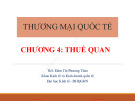
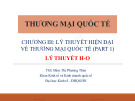

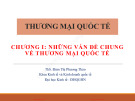



![Đề thi cuối kì Chính sách thương mại quốc tế: Tổng hợp [năm]](https://cdn.tailieu.vn/images/document/thumbnail/2025/20251112/llinhlinhlinhlinhh@gmail.com/135x160/60241762917589.jpg)


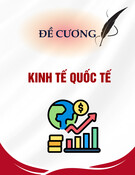
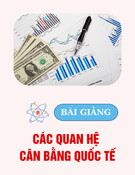
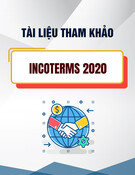
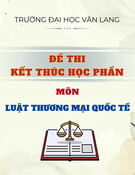
![Đề thi Luật Thương mại quốc tế học kì 1 năm 2024-2025 có đáp án (Đề 1) - [kèm đề thi]](https://cdn.tailieu.vn/images/document/thumbnail/2025/20250925/kimphuong1001/135x160/14521758785752.jpg)

